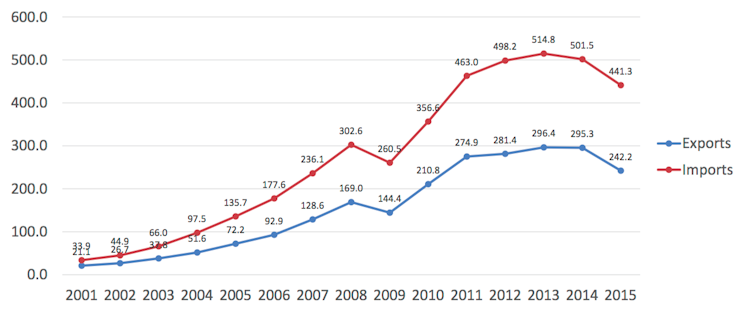-
play_arrow
On The Street On The Air | Kaya 959
BRICS summit in Johannesburg: here’s what the five countries are looking for
By: Xuebing Cao, Keele University

All eyes are on Johannesburg for the 2018 BRICS summit, as the likes of Vladimir Putin, Xi Jinping and Narendra Modi take their places at the table. It marks the tenth annual gathering for this international organisation of the leading emerging economies. So what can we expect?
The summit of the BRICS countries – Brazil, Russia, China, India and South Africa – started in June 2009 at Yekaterinburg, when Russia hosted the leaders of this bloc, though it did not originally include South Africa. BRIC became a formal institution the following year, aimed at facilitating global political and economic transformation, and South Africa officially joined in 2011.
Much has been written about this group’s threat to the Western-dominated world economic order. BRICS formed the New Development Bank in 2014, the first major international development bank with no participation from the OECD countries. The following year it established the BRICS Contingent Reserve Arrangement, widely regarded as a rival to the International Monetary Fund. The bloc has also been trying to find new ways of engaging in international affairs by leading on key issues such as climate change, regional security and anti-terrorism.
By 2016, the BRICS bloc had 41% of the world’s population and just under 30% of the territory. The five countries control 23% of global GDP, worth about US$40.6 trillion (£30.9 trillion), and 18% of trade. The group is growing impressively if you take it as a single entity, averaging 3.8% in 2015, 4.2% in 2016 and 5.1% in 2017 – though China and India are growing much faster than the rest. Xi Jinping in 2017 referred to the countries’ “golden decade”, though it does depend on who you are talking about.
Trading insults
The summit comes at a time when the West is arguably in decline. We see the US threatening trade wars with most other countries, above all China, but also even allies like the EU. The threat to global trade will be top of the agenda at the BRICS summit – hardly surprising when China’s economic weight gives it such a powerful role within the bloc. Russian economy minister Maxim Oreshkin said recently:
The summit is about the context … We are at a time when the US and China announce new measures almost every week.
Johannesburg will see much emphasis on consolidating members’ trade relations through the likes of reduced tariffs. This might boost trade between the countries, which has been stagnant or declining in recent years.

SAIIA
Africa and sustainable development will also receive much attention this year. Despite the heavyweight delegates list, South African leader Cyril Ramaphosa will no doubt do his best to steal everyone’s thunder both as host and debutante president. His country’s economy has been shrinking, with sectors such as mining and farming in the doldrums, made worse by corruption problems that came to symbolise his predecessor Jacob Zuma’s administration.
Ramaphosa will be hoping to secure extra investment and trade agreements from his counterparts. The leaders of other African countries and institutions are also attending the summit as part of BRICS’ ongoing outreach programme, following tours of the region both by Modi and Xi. These representatives will be particularly interested in the progress of China’s Belt and Road Initiative to reduce barriers across Asia, perhaps in the hope that it could one day involve them, too.
Meanwhile, the Brazilian delegation will be looking for new forms of co-operation that can benefit their tenuous economy, which is threatened by various knock-on effects from the American trade and currency war – with China its main trading partner. Brazil also stands in the shadow of debt problems that are troubling much of Latin America. Expect to see President Michel Temer seeking more financial support from the New Development Bank, though his bigger goal should be deepening trade relations that will help his country’s balance of payments in the longer term.
The Putin embrace
We are perhaps not expecting President Putin to provide significant economic leverage to other members, but Russia’s substantial political influence will be his main card to play at the summit. At a time when Russia is on the verge of being a pariah to some countries, not least the UK, it will suit Putin to demonstrate warm relations with his fellow BRICS members.
Following Putin’s recent bilateral talks with Donald Trump, the summit is a chance for Russia to enhance its global position and undermine Western containment, particularly the economic sanctions imposed after the Crimean crisis in 2014. The ever closer ties between Russia and China will presumably be a theme, after China’s foreign minister recently described them as being at “their best level in history”.
As for India, the role it plays at the summit will be very interesting. On the one hand, Modi will be seeking new deals for his country, the second largest economy in the bloc after China. On the other hand, India is playing a delicate geopolitical game with the US, China and Russia as their spheres of influence wax and wane across Asia and the Middle East. Show excessive favour to one side and there is the potential for ramifications across the region.
![]() In all, the summit is a useful opportunity for these countries to remind the world of what multilateralism can achieve, and chart new strategies for the coming decade. We may not see any significant leap forward as discussions get underway, but we’ll certainly see the emerging powers attempting to loud-speak their influence at a time of growing protectionism and uncertainty. This bloc has yet to create anything resembling a new world order, but the celebrations from the global south in Johannesburg will certainly reverberate around the world.
In all, the summit is a useful opportunity for these countries to remind the world of what multilateralism can achieve, and chart new strategies for the coming decade. We may not see any significant leap forward as discussions get underway, but we’ll certainly see the emerging powers attempting to loud-speak their influence at a time of growing protectionism and uncertainty. This bloc has yet to create anything resembling a new world order, but the celebrations from the global south in Johannesburg will certainly reverberate around the world.
Xuebing Cao, Lecturer in Industrial Relations, Keele University
This article was originally published on The Conversation. Read the original article.
Written by: Natasha
Similar posts
QUICK LINKS
UpComing Shows

959 Music Weekdays
Kaya 959 Hits
Real. Familiar. Memorable. Kaya 959 brings you the music you know and love from our playlist. Uninterrupted. Thursdays 20h00 to 21h00
close
The Best T in the City
With T Bose
He has held it down in the world of mid-morning radio with the best music, riveting topics, brilliant mixes and interesting guests. Every weekday, The Best T proves why he is the BEST by connecting to you like only your bro or favourite uncle could. He lets his listeners dictate the songs they want to hear in the ever-popular Top 10 at 10, and his Three Teaspoons never run out. Catch The Best T in the City Mondays to Fridays from 09h00 to 12h00.
close
Feel Good
With Andy Maqondwana
Feel good about feeling good! That's exactly what The Feel-Good show is about. An escape from the negativity that surrounds us, indulging you in good feels. Pass it on to one and all. Spread the good feeling around Gauteng with Andy Maqondwana.
close
Kaya Biz
With Gugulethu Mfuphi
The world of business is simplified for you by Kaya Biz with Gugulethu Mfuphi. This fast-paced award-winning business show talks to the corporate giants as well as up and coming entrepreneurs about their wins and challenges. Gugulethu invites guests to offer their analyses of markets and economies, and also delves into issues of personal financial wellness. Kaya Biz airs Mondays to Thursdays 18h00 to 19h00.
close
Point of View
With Phemelo Motene
Point of View with Phemelo Motene delves into the day’s current affairs, touches on real issues that affect people’s daily lives and shares expert advice on questions posed by the audience. Mondays to Thursdays 20:00 to 22:00.
closeConnect with Kaya 959
DownLoad Our Mobile App
© 2024 Kaya 959 | On The Street On The Air
















